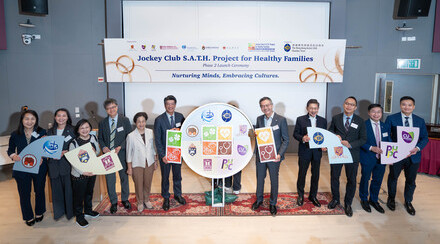CU Medicine reveals world’s first study on the impact of temperature on nearly 3,000 plasma proteins in the Chinese population Over 80% associated with systolic blood pressure and incident ischemic heart disease risk
The Chinese University of Hong Kong (CUHK)’s Faculty of Medicine (CU Medicine), the University of Oxford, Fudan University and the London School of Hygiene and Tropical Medicine have jointly conducted the world’s first and largest study of its kind, assessing the effect of temperature changes on nearly 3,000 plasma proteins in Chinese adults. It was found that 949 plasma proteins exhibited significant responses to temperature changes, with more than 80% associated with systolic blood pressure and incident ischemic heart disease risk. The study revealed the mechanism of how temperature changes may increase the risk of cardiovascular disease by affecting inflammation and platelet aggregation. The findings provide notable insights into how increasingly abnormal global weather affects health. The research has been published in the renowned international environmental science journal Environmental Science & Technology.
The world’s first and largest assessment of the impact of temperature on plasma proteins in the Chinese population
Numerous studies have associated millions of deaths with non-optimal ambient temperatures every year, but little is known about the underlying biological mechanism. As proteins are widely recognised as valuable biomarkers that change in response to physiological and pathological conditions, plasma proteome, the extensive set of proteins that serve as the main component of blood, is pivotal for predicting disease risks and understanding etiology.
Recent plasma proteomic studies have primarily focused on the impact of long-term average temperature on Western populations, overlooking the daily temperature variations that could cause acute health effects and the potential impact on people from low- and middle-income countries where access to central heating or air conditioning in coping with non-optimal temperatures is limited.
This study is one of the largest of its kind. Researchers examined the concentration of nearly 3,000 proteins in blood samples from nearly 4,000 Chinese adults across 10 geographically diverse areas in China, ranging from Harbin to Hainan, in the China Kadoorie Biobank1. Taking into account the time-lag effect of temperature changes, such as the few days it may take for low temperatures to affect proteins, temperature recorded in the study areas was categorised into two levels: “too cold” (the lowest 5% temperature recorded in the study areas, i.e. below -2.1°C) and “too hot” (the top 5% of temperature recorded, i.e., above 29.5°C), with a median reference temperature of 17.7°C.
High temperature takes a greater toll on plasma proteins
The research team identified 949 plasma proteins significantly associated with non-optimal temperatures. More than 80% of them are also associated with systolic blood pressure and incident ischemic heart disease risk. These proteins are enriched by pathological pathways including inflammation, immunity and platelet aggregation.

Featured are research team members (from left) Professor Ho Kin-fai, co-corresponding author and Professor from the Jockey Club School of Public Health and Primary Care, Dr Guo Yitong, the lead author and a postdoctoral fellow from the Jockey Club School of Public Health and Primary Care at CU Medicine, and Dr Peter Chan Ka-hung, the co-corresponding author and a Senior Environmental Epidemiologist at Nuffield Department of Population Health of the University of Oxford.
The research also revealed the relationship between temperature and plasma protein levels. At low temperatures, the effect of temperature on the human body is the most notable within the range of 5°C to 10°C. At temperatures below 5°C, the effect does not worsen, possibly due to the use of heating or physiological adaptations of the human body. Conversely, at temperatures above 17.7°C, the change in proteins showed a linear association for every 1°C increase in temperature, indicating that the research participants had weaker ability to adapt to high temperatures, which could be related to living conditions, such as the absence of air conditioning, or physiological mechanisms.
Dr Guo Yitong, the lead author of the study and a postdoctoral fellow from the Jockey Club School of Public Health and Primary Care at CU Medicine, said: “The study reveals new clues about health risks associated with climate change, such as a higher incidence of cardiovascular disease in winter, which may be associated with higher levels of inflammatory proteins induced by low temperature. These proteins may serve as important biomarkers for the development of protein-specific drugs that can reduce the risk of temperature-related diseases.”
Dr Peter Chan Ka-hung, the co-corresponding author and a Senior Environmental Epidemiologist at Nuffield Department of Population Health of the University of Oxford, added: ‘‘Our research underscores the importance of understanding the biological mechanisms through which temperature and other environmental factors affect health outcomes. Identifying specific proteins influenced by temperature can help us better understand how temperature affects human bodies and formulate strategies to mitigate these effects.’’
Professor Ho Kin-fai, co-corresponding author and Professor from the Jockey Club School of Public Health and Primary Care, CU Medicine, said: “This innovative interdisciplinary study acts as a temperature-protein map that reveals how climate and environment affect health. In extreme weather conditions, the body uses hundreds of proteins in response and these changes have a prolonged impact on human health.”
1The China Kadoorie Biobank is one of the world’s largest prospective cohort studies. A long-term collaboration between the UK and China, it aims to generate reliable evidence about the lifestyle, environmental and genetic determinants of a wide range of common diseases that can inform disease prevention, risk prediction and treatment worldwide.
























































